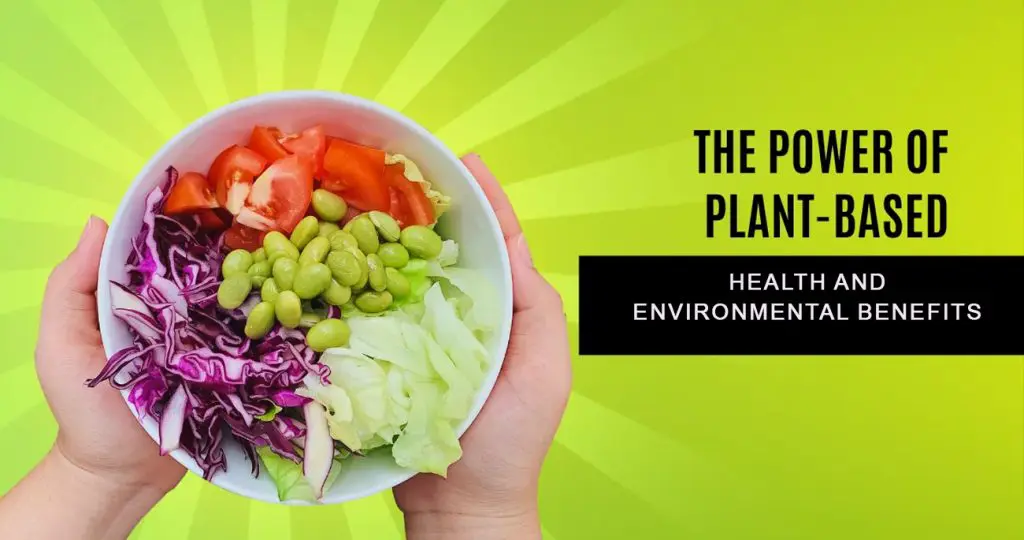Plant-based diets have gained significant popularity over the years, and for good reason. Not only do these diets provide numerous health benefits, but they also have a positive impact on the environment. By focusing on consuming plant-based foods, individuals can improve their overall well-being while also contributing to a more sustainable planet. In this post, we will explore the power of plant-based diets, highlighting the health benefits they offer and the positive environmental changes they can bring about. Let’s dive in!

The Importance of Plant-Based Diets
Plant-based diets provide numerous health benefits. By focusing on consuming mainly plant-based foods such as fruits, vegetables, whole grains, and legumes, individuals can improve their overall well-being.
Improved Digestion and Gut Health
Plant-based diets are rich in dietary fiber, which helps promote healthy digestion and prevents constipation. The fiber content also supports a healthy gut microbiome, which is crucial for optimal digestion and nutrient absorption.
Rich in Essential Nutrients and Minerals
Plant-based diets are packed with essential nutrients such as vitamins, minerals, and antioxidants. These nutrients play a vital role in maintaining a strong immune system, supporting healthy cell function, and reducing the risk of chronic diseases.
Improving Health through Plant-Based Nutrition
Plant-based nutrition can have a major impact on improving overall health and well-being. Here are some ways in which adopting a plant-based diet can benefit your health:
1. Plant-based nutrition can help in weight management:
Plant-based diets are typically lower in calorie density, making it easier to achieve and maintain a healthy weight. Fruits, vegetables, whole grains, and legumes are rich in fiber and water content, which helps you feel full and satisfied while consuming fewer calories.
2. Plant-based diets reduce the risk of heart disease:
Research has shown that plant-based diets, particularly those rich in fruits, vegetables, whole grains, nuts, and seeds, can significantly lower the risk of developing heart disease. These foods are naturally low in saturated fats and cholesterol, helping to keep your heart healthy.
3. Plant-based diets can lower blood pressure:
High blood pressure is a major risk factor for heart disease. By following a plant-based diet, you can naturally reduce your blood pressure levels. Plant-based foods are typically low in sodium and high in potassium, which helps regulate blood pressure.
By prioritizing plant-based nutrition, you can improve your overall health and reduce the risk of chronic diseases.
Reducing the Risk of Chronic Diseases
Plant-based diets have been found to have a positive impact on reducing the risk of various chronic diseases. Here are some ways in which plant-based diets can help:
Lowering the Risk of Diabetes
Studies have shown that plant-based diets can lower the risk of developing type 2 diabetes. A diet rich in whole grains, fruits, vegetables, legumes, and nuts can improve insulin sensitivity and help regulate blood sugar levels.
Reducing the Risk of Certain Cancers
Evidence suggests that a plant-based diet can lower the risk of certain types of cancer, including colorectal, breast, and prostate cancer. Plant-based foods are usually low in saturated fats and high in fiber, antioxidants, and phytochemicals, which may have protective effects against cancer.
Improving Insulin Sensitivity
Research indicates that plant-based diets can improve insulin sensitivity, which is essential for preventing and managing conditions like metabolic syndrome. By including more plant-based foods in your diet, you can enhance your body’s ability to use insulin effectively.
Environmental Impact of Plant-Based Diets
Plant-based diets have a lower carbon footprint compared to diets that include animal products. Livestock farming contributes significantly to greenhouse gas emissions, including methane and nitrous oxide, which are major contributors to climate change. By choosing a plant-based diet, you can reduce your carbon footprint and help mitigate global warming.

Additionally, plant-based diets help reduce deforestation and habitat destruction. Animal agriculture is one of the leading causes of deforestation, as forests are cleared to make space for livestock and feed crops. By opting for plant-based foods, you can contribute to the preservation of forests and protect countless species that call them home.
Furthermore, plant-based diets require less water and help reduce water pollution. Animal agriculture consumes large amounts of water for animal hydration, feed crop irrigation, and processing. By consuming plant-based foods, you can save water and lower the pollution caused by agricultural runoff into rivers and oceans.
Sustainable Food Choices for a Better Planet
Choosing sustainable food options is not only beneficial for our health but also for the environment. By opting for plant-based foods, we can contribute to conserving biodiversity and reducing our carbon footprint.
Conserving Biodiversity
Plant-based diets play a crucial role in biodiversity conservation. Animal agriculture often requires large areas of land, leading to deforestation and habitat destruction. By choosing plant-based foods, we can reduce the demand for land for animal farming, allowing natural habitats to thrive and protecting endangered species.
Reducing Greenhouse Gas Emissions
The production of animal-based products generates substantial greenhouse gas emissions. Livestock farming contributes significantly to climate change through methane production and land degradation. Plant-based diets, on the other hand, have a lower carbon footprint as plant cultivation requires fewer resources and produces fewer emissions. By adopting a plant-based lifestyle, we can reduce our contribution to global warming.
Supporting Sustainable Farming Practices
Plant-based diets support sustainable farming practices that aim to minimize environmental impact. Many plant-based food producers focus on organic and regenerative farming methods, which prioritize soil health, water conservation, and biodiversity. By supporting these practices, we contribute to the development of a more sustainable and resilient food system.
The Link Between Plant-Based Diets and Climate Change
Climate change is a pressing global issue, and the link between plant-based diets and its mitigation is gaining recognition. One significant contributor to climate change is animal agriculture. The production and consumption of meat and dairy products generate a substantial amount of greenhouse gas emissions, including carbon dioxide, methane, and nitrous oxide.
By embracing plant-based diets, individuals can make a positive impact on the environment. Plant-based diets have lower greenhouse gas emissions compared to diets that include meat and dairy products. The cultivation of plant-based foods requires less energy, land, and water resources as compared to animal farming. This reduced demand for resources helps in reducing the overall carbon footprint.
Furthermore, plant-based diets can contribute to reducing deforestation and habitat destruction. Animal agriculture often requires large areas of land for livestock grazing or to grow feed crops. This leads to the clearing of forests and destruction of natural habitats. By choosing plant-based foods, individuals can play a part in preserving forests and protecting biodiversity.
Supporting Biodiversity through Plant-Based Eating
Plant-based diets promote biodiversity conservation. By consuming plant-based foods, you help preserve diverse ecosystems and habitats, which are essential for maintaining a healthy environment.
Furthermore, plant-based diets reduce the demand for land for animal farming. Livestock production requires vast amounts of land, leading to deforestation and habitat loss. By choosing plant-based foods, you are helping to protect natural ecosystems and the wildlife that depends on them.
Choosing plant-based foods also helps protect endangered species. Deforestation for animal agriculture threatens the habitats of many endangered animals. By reducing the demand for animal products, you contribute to their conservation and help prevent their extinction.
Tips for Adopting a Plant-Based Lifestyle
Transitioning to a plant-based lifestyle can be a gradual process. Here are some tips to help you get started:
- Incorporate more plant-based meals: Begin by adding more plant-based meals to your diet. Start with one or two meals per week and gradually increase the number.
- Gradual transition: Instead of making a sudden switch, gradually eliminate animal products from your diet. Replace them with plant-based alternatives.
- Educate yourself: Learn about plant-based nutrition and recipe options. There are numerous resources available such as books, documentaries, and websites. Understanding the nutritional benefits of plant-based foods will help you make informed choices.
Remember, everyone’s journey is different, so find an approach that works best for you. Whether you choose to adopt a fully plant-based diet or simply incorporate more plant-based meals, every step towards a plant-based lifestyle makes a positive impact on your health and the environment.
Conclusion
Plant-based diets offer numerous health benefits and have a positive impact on the environment. By adopting a plant-based lifestyle, individuals can improve their health, reduce the risk of chronic diseases, and protect the planet. Plant-based nutrition provides essential nutrients and minerals, aids in weight management, and lowers the risk of heart disease and diabetes. Moreover, plant-based diets have a lower carbon footprint, reduce deforestation and habitat destruction, and save water and reduce pollution. By choosing plant-based foods, we can support sustainable farming practices, conserve biodiversity, and help mitigate climate change. It is important to start incorporating more plant-based meals into our diets and educate ourselves about plant-based nutrition and recipes. Together, we can harness the power of plant-based diets to improve our health and create a better future for our planet.

4.4/5 - (8 votes)



